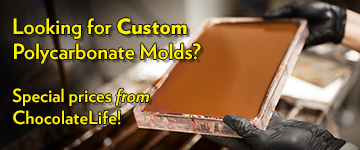Keith;
Thanks for the feedback. At this time we don't ship anywhere outside of Calgary for the simple reason that the demand here in Calgary (over a million people) is enough to consume all that we make. Choklat isn't a bulk producer. Economically there's simply no reason to broaden our reach to other markets when our current demographic consummes all of our supply.
I'll be the first to admit that differentiating our product and our strategy from that of our peers over the past few years has been difficult.The strategy hasin no way meant to make other chocolate makers look bad, however I know it comes across that way in some readers' eyes. The best analogy I can think of is that of the wine industry here in Calgary. Imagine for years that the consumer has been sold "red wine", "white wine", and "zinfandel" by EVERY wine store. No brands. No Sommoliers, No vineyards, no nothing. Everybody gets the same red, white, and zin and has been led to believe that the wine stores all produce their own wine because it's bottled differently from store to store. Inside however, the product is more or less the exact same from the same supplier. Then along comes a wine store that imports and sells wine properly, and employs a sommolier to help educate consumers about the differences that grapes, region, weather, soil, fermentation, etc play in the production of their varieties of wines. The new wine store clearly opens the consumers eyes to the vast array of taste possibilities. At the same time it's mere presence seems pretentious to those who are happy with the ol' "stand by" red, white and zyn.
There is simply no way for that new wine store to differentiate its products without disclosing to the consumer in even the most subtle way that the traditional way of buying wine has been misleading. The current stores do NOT make the wine they sell, even if their name is on the bottles! Some consumers will be upset at the new store for "attempting to make the existing peers look bad", while others will applaud the new bold direction, and honest disclosure.
This has been the case with my business. It has doubled in size since I first opened my doors, and this year will see even more growth yet. It appears that while a few feathers get ruffled, most people appreciate the honest approach to things. I would hazard a guess that those whose feathers are ruffled are either:
1) big fans of our peers who are overly defensive, or
2) people who don't care about the truth or quality of anything they put in their mouth.
What I DO know however, is that my outspoken approach to promoting chocolate here in Alberta has caused our largest competitor to change the verbiage on their packaging from "Manufactered in Calgary Alberta" to "Manufactured from imported ingredients", and at the same time OTHER small chocolatiers are now beginning to promote the brands chocolate they use rather than tell people it's "their" chocolate.
As far as I'm concerned, if my peers are making changes because of what I'm doing, then I'm definitely doing something right, and those who don't like my honest, candid approach, can crawl back into their hovel and suck a lemon. (not that I'm saying you don't appreciate it Keith! Haha!).
On the topic of early morning tastings.... Hmmm... Is that before or after brushing my teeth? An apple or orange BEFORE tastes a whole heck of a lot better than after! I wonder if chocolate is the same.
Cheers
Brad
updated by @brad-churchill: 06/15/15 09:58:55

